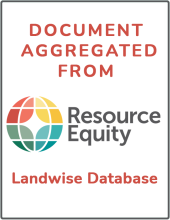Land Library Search
Through our robust search engine, you can search for any item of the over 73,000 highly curated resources in the Land Library.
If you would like to find an overview of what is possible, feel free to peruse the Search Guide.
/ library resources
Showing items 1 through 9 of 69.Many people in the vast rural areas of Africa lack access to financial services, and most commercial banks are not interested in moving into these areas due to their low income levels, lack of scale economies, and poor infrastructure.
Since the 2008 food price crisis, foreign investors have been acquiring more and more land in poor countries for producing foodstuffs and biofuels for their own use. Such investments have the potential to promote rural development and food security worldwide.
Nerica – New Rice for Africa is the name of the great biotechnological success in rice breeding. What scientists created in the lab using modern methods, namely hybrids of African rice and Asian rice, had already come into being decades ago by chance in West African ?elds.
This report discusses the potential benefits of, and the current challenges for, agricultural land investment in Tanzania and Mozambique. The paper finds that there is little, if any, development potential in these investments.
The transition to a market economy has sparked Vietnam's unprecedented urbanization and industrialization.
The research team set out to answer three research questions: 1) What are rubber investment’s key features with regard to the investment process, investor identity, location, activities and scale?
INTRODUCTION: The following report has been compiled to bring to the attention of a wider audience many of the problems facing the people of Burma, especially its many ethnic nationalities.
ABSTRACTED FROM INTRODUCTION: Since đổi mới, Vietnam witnesses a rapid urbanization and industrialization, which leads to conversions of a large area of agricultural land and other types of land, and this has forced thousands of farmer households to change their traditional livelihoods and even t





